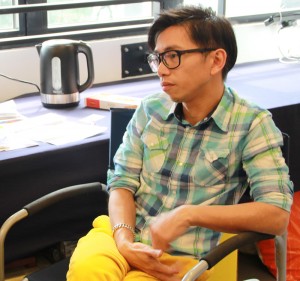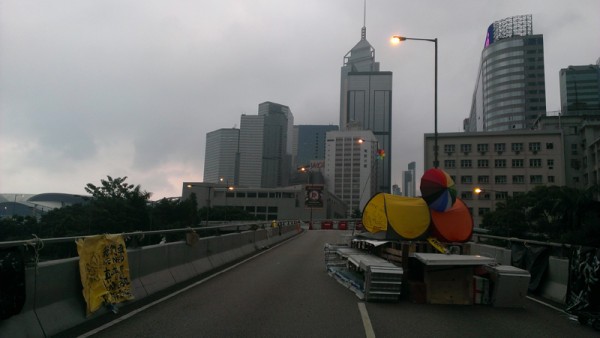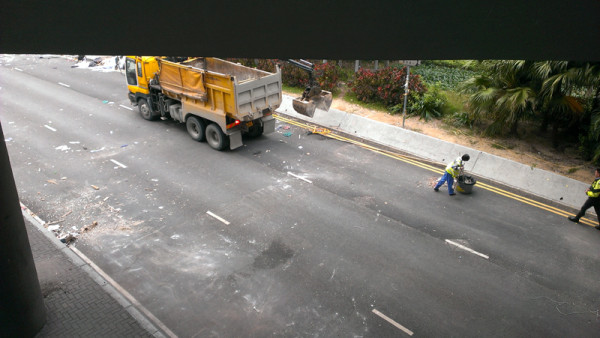Listen 來聽
Interview 採訪:Law Yuk-mui/ 羅玉梅, Liza Chan/ 陳曉盈
Editing 編輯、整理:Law Yuk-mui/ 羅玉梅
English Translation 英譯 : Winnie Chau/ 周潁榆
Transcription謄錄: Janie Chan Tsang/ 陳錚02/26/2015
Hong Kong/ 香港
breakfast, image, point of hearing’, village, 影像, 早餐, 村, 聽點
Solomon Yu Tik-man is interested in exploring image as text and as a medium for thinking and experiencing. His works invite the audience to experience and explore existing image materials anew, and question the structures of reality underlying them.
http://solomontyu.wix.com/foldednotes

The Library: Are most of your sound clips recorded with a mobile phone?
Solomon Yu Tik-man: Most of them are, although sometimes I would use some special recording equipment are relatively large in sizes. I don’t want to bring them along all the time when I go out, so I use my mobile phone directly.
The Library: Under what conditions would you make a recording?
Solomon Yu Tik-man: Usually it is something interesting or sound that I’d like to hear again, as well as something I really wanted to record but images might not be able to present it.
The Library: What is it that images may not be able to present?
Solomon Yu Tik-man: Your question makes me think right away: why not make a video recording that comes with images and sounds? I find images highly directional, meaning that behind the visuals, the person who holds the camera imposes a strong point of view. I believe there is the so-called ‘point of hearing’ as well, but I’ve an impression that the scope of sound recording is wider. Thus, I’ve started sound recording in recent years. I can retrieve the feeling of the ambiance and condition of walking to a place through sound. If I made a video, I would be influenced by the moving images and wouldn’t immerse in its ambiance when I replay it.
The Library: When did you start to pay attention to the sonic aspect of social movements?
Solomon Yu Tik-man: The first social movement that made me aware of its sound is the “Anti–XRL”(Anti–express Rail Link Movement). During the Anti-XRL, many people held a microphone and had a discussion outside the former Legislative Council and at times describing the participating students and ascetics on the scene. The ascetics didn’t make a sound but they manifested a strong plea. They walked past one by one soundlessly. Such a contrast is a very significant sonic experience to me.
The Library: What did you record this time?
Solomon Yu Tik-man: This sound clip was recorded on the day of clearance. Originally, I had been stationing at the Hong Kong Academy for Performing Arts but that side was cleared up. So I walked along the bridge towards Admiralty. The police cleared up along that direction and tucks were removing things from there. I followed them and the sound got closer and closer. The tucks continued the clearance towards Admiralty, Admiralty Centre and the MTR station, until the police spotted us and asked, “Do you want to be arrested together with them? If not, you have to leave.” At that point, we weren’t able to go further, so we left.
The Clearance
04:00PM, 12/11/2014, Admiralty
The Library: Is the other sound clip recorded early on?
Solomon Yu Tik-man: It was recorded at half-past six in the morning. We usually got up early sleeping there (Admiralty), naturally at around six o’clock. During that period of time, I would walk around and make recordings. Outside the Central Government Offices, there are many trees and birds, which wouldn’t be heard when traffic passes by during ordinary days.
In the morning, it felt like a village. At night, people coming and going; they argued about all sorts of matters. It felt like a heated kitchen. There was a Saturday morning I saw some women who looked like office ladies, perhaps after a night out at weekend, bringing us loads of McDonald’s breakfast. Even if you thought they like having fun, at least you felt that they were concerned about this event and appreciated us staying here to watch over the whole place. I really wanted to have breakfast and when there were people bringing you hot breakfast, it gave you a strong feeling of a village. I wanted to capture an instance like people riding past here on a bike – something non-visual but could represent the ambiance. Even though eventually, sound may not be able to represent it, I wanted to capture it through one more angle.
Harcourt Village
06:00 AM, 11/16/2014, Harcourt Road
The Library: What was your experience sleeping there?
Solomon Yu Tik-man: I think…… haha, actually it wasn’t really comfortable to sleep there. Moreover, at times I would hear many people talking. There were also times when people who were possibly from the Blue Ribbon Movement come and bust up the place. I had never slept on the street like that. Nor had I camped in the city. I found this something worth experiencing. Not until after you’d slept on the ground that you would know it could be that hard, that uneven, or tilted. I had tried to sleep on the bridge, which is either tilting this way or that way. You had to adjust yourself to be able to sleep at a certain angle, which was quite funny.
What’s more, when I slept, the street lights were kept on the whole night. The entire camp was illuminated. They were turned off at around 6 a.m. They might be adjusted to be turned off automatically, or according to the brightness level – I don’t know if there is such a powerful sensor or not. This photograph was, I think, taken that day. You can see the sky started to lighten up and these street lights hadn’t been turned off yet. At a time like this, there were very few people on the street. Who would go out? I would patrol the village, listening to birds sing.
Solomon Yu Tik-man is interested in exploring image as text and as a medium for thinking and experiencing. His works invite the audience to experience and explore existing image materials anew, and question the structures of reality underlying them.
余廸文創作主要探索影像如何作為我們思考和經驗的媒介,邀請觀眾重新體驗發掘既有的影像物料,以向它們背後的現實結構作出提問。
http://solomontyu.wix.com/foldednotes
聲音圖書館:你的聲帶主要是用手提電話錄的?
余廸文: 主要是,雖然有時我也會用一些特別的錄音器材,但它們的體積比較大,我不想經常攜帶出街,所以直接用手提電話。
聲音圖書館:在甚麼情況下你會錄音?
余廸文: 通常是一些有趣或我很想再聽的聲音;也有是我覺得很想記錄,但影像未必記錄到的聲音。
聲音圖書館: 影像未必記錄到的東西是甚麼?
余廸文: 你這樣問,我立即想,不如拍錄像,有影像又有聲音。我覺得影像的導向性很強,即是影像背後,拿攝影機的人的視點很強,我相信錄音都會有所謂的「聽點」,但我感覺錄音的廣度(scope)比較寬,所以近年我便嘗試錄音。我走到一某處,那裡的氛圍和狀態我可以透過聲音再感受到;如果拍攝錄像,重播時我會受流動影像影響,不會專注地去感受那個氛圍。
聲音圖書館: 你是甚麼時候開始注意社會運動的聲音部分?
余廸文: 我第一次注意到社會運動的聲音是「反高鐵運動」。當時在舊立法會外,有很多人拿著麥克風討論,中間會形容現場參與的學生和苦行者。苦行是沒有聲音的,但卻表現出強烈的訴求 。一個個人在你面前走過,沒有聲音,這個對比,我覺得是對聲音很重要的體驗。
聲音圖書館: 你這次錄了甚麼聲音?
余廸文: 這條聲帶是清場那天,我原本在演藝學院那邊,那邊清了場,我便沿天橋那邊走下去。警察往金鐘方向清場,這些車便在這邊鉗東西走。我跟著它們走,聲音愈來愈近,車一直向金鐘、海富中心和地鐵站那邊清場,直到警察看到我們問:「你們是不是想和他們一起被人拘捕呀?如果不是,你們就要離開了。」到這裡,不能再前進,我們便走了。
清場
04:00PM, 12/11/2014, 金鐘
聲音圖書館: 另一段是早期錄的?
余廸文: 是早上六時半錄的。在那裡(金鐘)睡通常不會晚起床的,六點多便會自動醒來。我會在這段時間,走來走去,做錄音。政府總部外面有很多樹、很多小鳥,平日行車便不會聽到。
在早上,你會感到這裡很像一條村,晚上人來人往,爭吵甚麼都有,那是熱哄哄的廚房感覺。我試過,早晨起來,有些或是OL(辦公室女郎)的女子,可能週末去完「威」,星期六早上便送來一大堆麥當勞早餐。即便你覺得她們去玩,起碼你感到她們是關心這件事,亦欣賞你留守整個場。我是很想食早餐的,有人送上熱呼呼的早餐,你會覺得很有一條村的感覺。比如人踏單車經過這些,都是我想捕捉的一種非影像可以交代的氛圍。即使最後,聲音亦未必能夠交待,但我想盡量捕捉多一個角度。
夏慤村
06:00 AM, 11/16/2014, 夏慤道
聲音圖書館: 你在那裡睡覺的經驗如何?
余廸文: 我覺得⋯⋯哈哈,其實不是睡得很好,而且偶然會聽到很多人談天,亦試過有可能是藍絲的人入來踢館。我從未試過這樣睡在街上,亦未試過在城市裡露營,我覺得這個機會是值得去經驗的。當你睡過地下,就知道原來地可以是這麼硬,這麼不平,甚至是斜的。我試過睡天橋,不是這樣斜,就是那樣斜,你要調整自己如何能夠在哪個角度入睡,這都挺好笑的。
還有睡覺時,永遠都亮著街燈,整晚都開著,整個帳幕都是光的,六時許它便會熄滅。可能是調控到某個時間自動熄滅,或因應光度,我不知道有沒有這麼厲害的感應器。這張相片,應該是那天拍的,你可以看到天開始光,而這些燈還未熄。這些時候,街上很少人,誰人會走出來呢?我會在這些時候巡村,聽小鳥唱歌。

Admiralty Morning/ 清晨金鐘

The Clearance/清場

The Clearance/清場